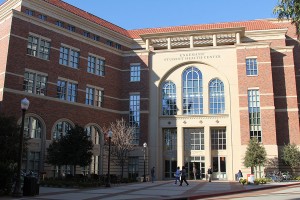USC creates new task force to address sexual violence
The Office of Equity and Diversity announced the launch of the Sexual Misconduct Prevention Task Force, a group consisting of five committees to address the issue of campus sexual assault and gender violence on Wednesday.

New home · The Center for Women and Men plans to relocate to the Engemann Student Health Center (above) in October 2014. – Razan al Marzouqi | Daily Trojan
The launch, announced by email, follows a March letter to the USC community from Ainsley Carry, vice provost for student affairs.
“Student safety is our highest priority, and USC wants all members of our community to have an environment free from sexual assault and misconduct,” Carry said in his March 25 letter. “We desire to enhance communication to achieve this priority.”
Though it is headed by Jody Shipper, Title IX Coordinator and executive director of the Office of Equity and Diversity and Ekta Kumar, director of the Center for Women and Men, the task force will be mainly student-run. Title IX is a federal provision barring gender discrimination in an education environment.
The five committees of the task force are student programming; clinical and advocacy procedures; communications; sexual assault policy; and inclusivity, LGBTQ and gender-based misconduct.
Ilene Rosenstein, director of student counseling services, will lead the clinical and advocacy procedures committee; Lynette Merriman, associate provost for support and advocacy, will lead the communications committee; Kelby Harrison, director of the LGBTQ Center, will lead the inclusivity, LGBTQ and gender-based misconduct committee; and Shipper will lead the sexual assault policy committee.
Kumar will coordinate the student programming committee in addition to managing the task force as a whole. She said that she has already received over 20 emails expressing interest in the committee, and that other coordinators she has spoken to have received similar levels of student interest.
“We’re getting a lot of student interest in it, which is good,” Kumar said.
“I think the whole point of the task force is to get students involved in this kind of work, and for their voices to be heard,” Kumar said. “And so that is why we separated it in five areas, to have a comprehensive approach.”
Though planning is its early stages, the five committees will collaborate with each other in managing and implementing student-led initiatives.
“Everyone who’s leading a committee, all of us will be touching base with one another, so there will be communication with different people who are running the subcommittees,” Kumar said.
Last week, USC hosted a national conference of university leaders to discuss issues related to sexual misconduct. Thirty-five universities sent representatives to the conference to discuss issues of prevention, bystander awareness education, education programs and legislation regarding college sexual assaults.
Such legislation includes the yes means yes law. California became the first state in the nation this week to institute an affirmative definition of consent. SB 967, popularly known as the yes means yes law, requires that people who engage in sexual activity give affirmative, unambiguous and voluntary consent to sexual acts. All California universities who use financial aid funding from the state must conform to the law.
Kumar said input from the conference encouraged the development of the task force.
“It reinforced the fact that we’re doing this and helped us recognize that we’re ahead of the wave,” she said.

